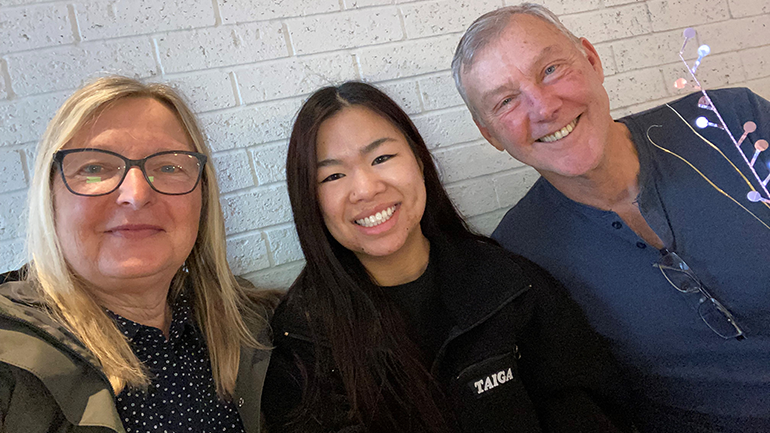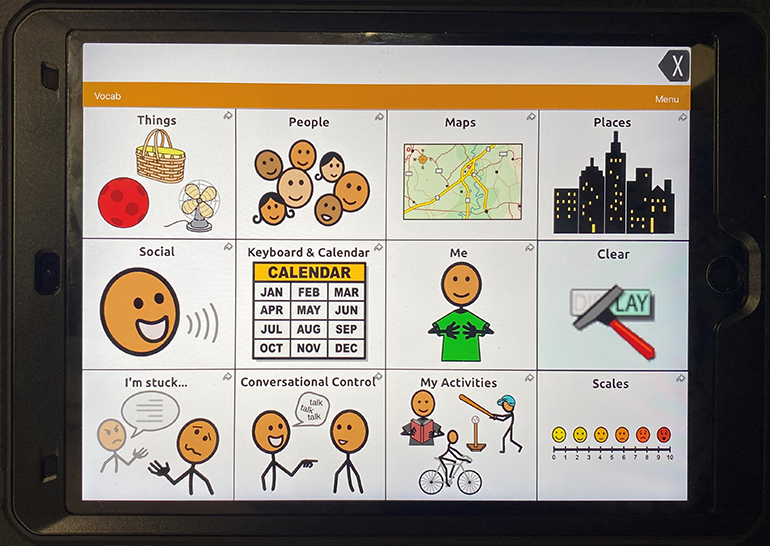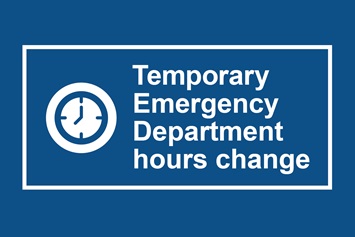
Terry Millichamp experienced a stroke in June 2022. He and his family share how instrumental Fraser Health speech-language pathologists were in his recovery journey.
Photo (Figure 1 from left to right): Deborah Millichamp, Emma Millichamp and Terry Millichamp
“Before my stroke, I was a newly retired lawyer. I was a golfer, a bicyclist, an active reader and I loved talking and debating with friends,” shares Terry Millichamp, stroke survivor and Fraser Health patient. “After the stroke, I felt slow, wobbly, quiet and I felt myself withdrawing from daily activities.”
When Terry was discharged from hospital, he was connected with the Speech-Language Pathology team at Peace Arch Hospital. It was through this referral that Terry and his family met Outpatient Speech-Language Pathologist Roujan Khaledan, who began working with them to find new ways to communicate.
“Generally, adult speech-language pathologists diagnose and treat dysphagia (swallowing impairments), cognitive communication impairments, dysarthria and apraxia of speech (speech impairments) and aphasia (language impairment),” says Roujan. “These disorders typically result from stroke, traumatic brain injury or progressive disease – like Parkinson’s disease or multiple sclerosis.”
Speech pathologists work in a variety of settings – from acute care and high intensity inpatient rehab, to outpatient programs.
Terry met his speech-language pathologist at the clinic at Peace Arch Hospital three days a week to work towards functional goals that would help him participate in his daily life.
“This included building up skills like speaking, reading and writing,” he explains.
Together they did speech and language therapy while Terry learned how to use an Augmentative and Alternative Communication device (AAC) as an additional tool to communicate.

Photo (Figure 2): An Augmentative and Alternative Communication (AAC) device
“Our speech-language pathologist also provided my daughter and wife with homework and tips and tricks on how to work together with me − this was a whole-family plan,” Terry shares.
Terry’s wife, Deborah adds, “There is a feeling of extreme helplessness as a caregiver to someone who has suffered a stroke. You know the vital, amazingly intelligent, strong, funny person is still in there, with a new limitation on getting their thoughts out. The Speech-Language Pathology team helped us understand how to do that.”
With the team’s help, Terry’s family learned to be patient and listen not only to his words but his actions and gestures and how to ask the right questions to support his communication.
“We learned a whole new language, one built on much love and a deep desire to hear each other,” Deborah explains.
The experience of working with Roujan had a profound impact on Terry’s daughter, Emma, who shares she has been inspired to pursue her own career in speech-language pathology.
“I feel [this is] a positive way to help people improve the quality of their lives,” she says. “I’ve begun taking prerequisites so that I can complete my Masters in Speech-Language Pathology. I would love to be part of a team that helps other people.”
Terry acknowledges that his recovery would not have been as successful without the interdisciplinary teams of care providers who helped him and his family, including the occupational therapists who work closely with the Speech-Language Pathology team.
“These medical professionals were our angels - helping us in the darkest hours to see the beginnings of hope,” he says.
He and his family continue to use the techniques they learned from the speech-language pathologists, while continuing to support each other daily.
“We use the techniques with success most of the time and with humble resignation when we fail – having a family hug and then trying again,” Terry says. “We are determined to find new ways to continue our growth while we live our lives with gratitude and joy."
Roujan says, “[Terry] has made so much progress and has worked so hard – he truly taught me about patience and perseverance. And yet, his story is shared, in one form or another, by all our patients. It’s important to recognize that our patients and their families are not alone, and that there is support out there for them.”


